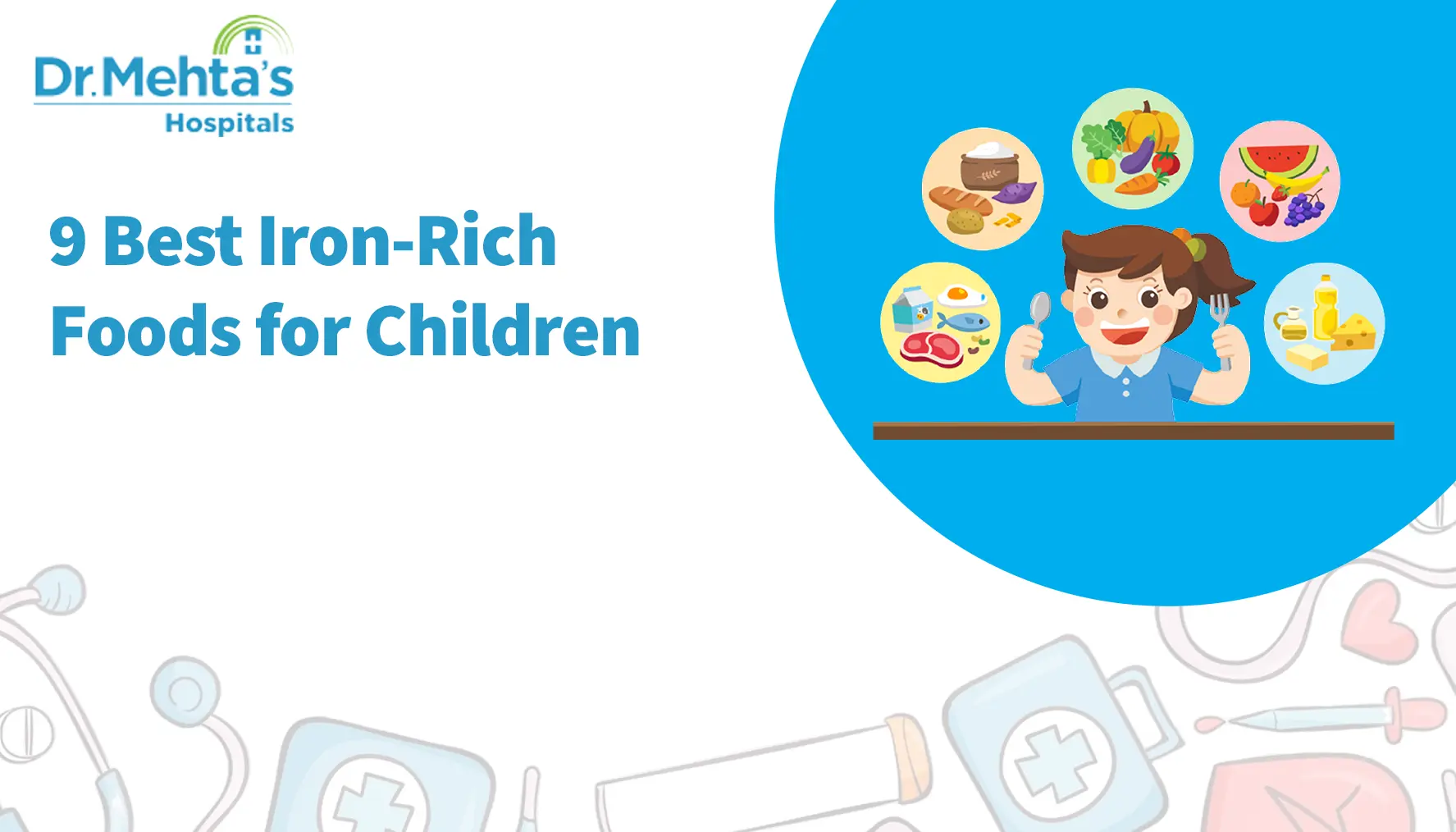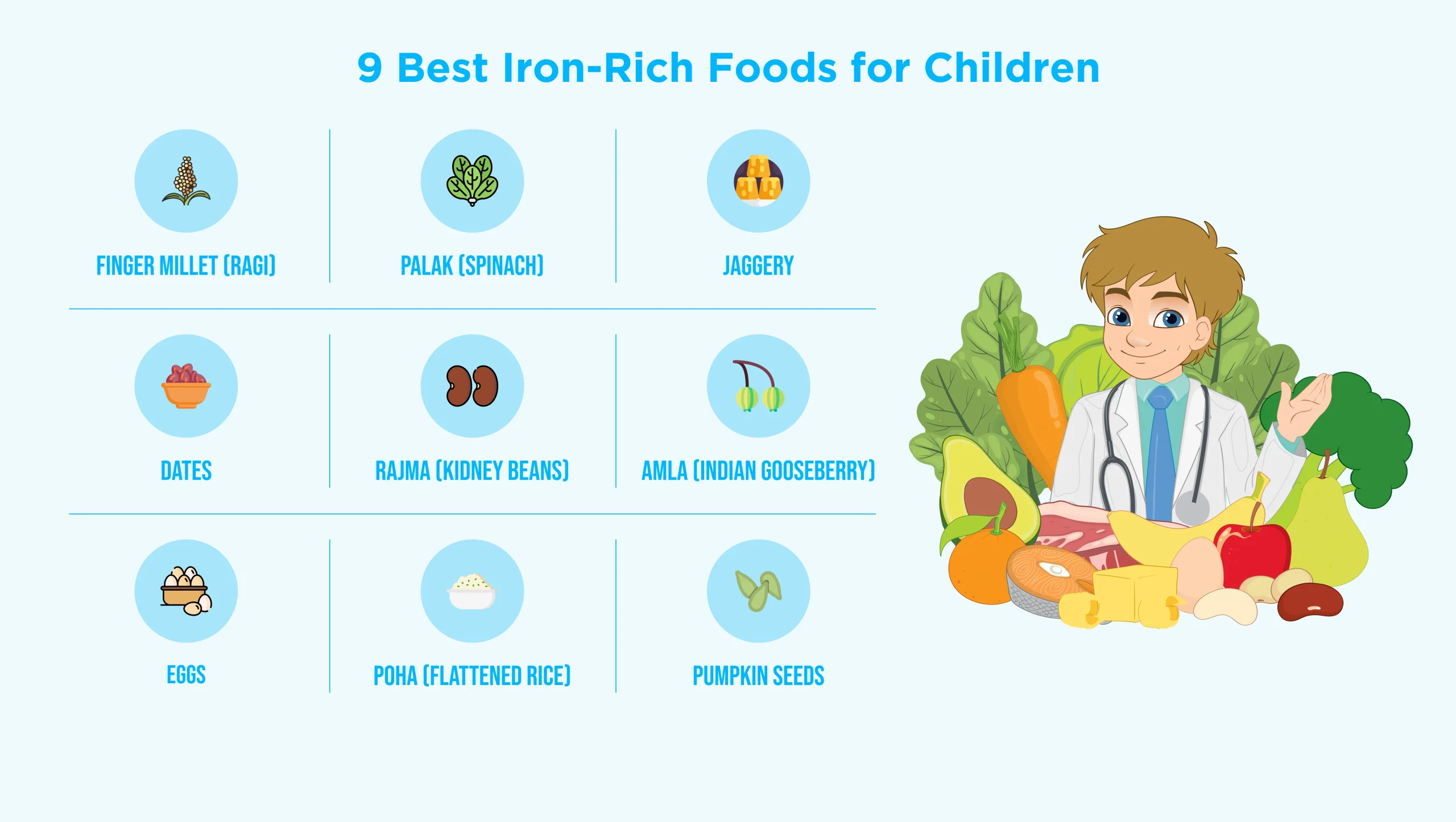Table of Contents

During their growth years, children need iron as one of the most important minerals for the body. It is essential for energy, immunity, brain development, and red blood cell formation (haemoglobin). An iron deficiency may lead to fatigue, paleness, and delayed learning, especially in infancy. That’s why one of the simplest ways to support your child’s overall health is by including iron-rich foods in their diet. According to the World Health Organization (WHO), iron deficiency anaemia is one of the most common nutritional disorders worldwide.
In this blog, we will guide you through some of the best iron-rich foods for babies and toddlers and address common questions to help you make informed decisions about your child’s nutrition.
Iron benefits the body in several important ways, especially in children:
Iron comes in two forms:
According to a national nutrition survey, 30.4% of children under the age of 5 in India were iron-deficient. Even more concerning, 49.7% were already anemic, highlighting how critical this issue is for child health.

Here are some easily available and commonly used iron-rich foods, as well as some of the best iron-rich foods for babies that are found in most Indian households:
Ragi is among the best iron-rich food grains available in India. It is also packed with calcium and fibre.
You can serve it as:
It’s a healthy option for toddlers and young children.
Spinach is a dark green leafy vegetable loaded with iron, fibre, and vitamins A and C.
Add it to:
Tip: Combining it with foods rich in vitamin C, like lemon or tomato, helps improve iron absorption. Spinach is one of the best vegetarian iron-rich foods in India.
This traditional sweetener is not only tasty but also a good source of iron.
Serve it with:
Use it as a healthier alternative to refined sugar. However, enjoy it in moderation as part of a balanced diet.
So, what is the food rich in iron for kids that is also sweet?
Dates are naturally sweet and contain a good amount of iron, making them ideal for children with a sweet tooth. It is one of the simplest iron-rich fruits to include in children’s meals.
Add them to:
They also aid digestion and are rich in potassium. Including immunity-boosting foods like these is especially important during early childhood.
Rajma is a great source of iron, protein, and fibre. When cooked well and served with rice or roti, it forms a balanced meal. Soaking rajma overnight and cooking it properly helps enhance its iron absorption.
You can include rajma in many simple Indian dishes, such as:
Though not high in iron, amla is rich in vitamin C, which significantly boosts iron absorption.
You can offer:
Eggs provide complete protein and a good amount of iron, especially in the yolk. This is an excellent option for growing children who are non-vegetarian and eggetarian.
Serve as:
Children with iron deficiency are more susceptible to fatigue and infections, especially when the weather changes. Proper nutrition plays a key role in supporting their health year-round.
Poha contains iron and is light and easy to digest. You can enhance its nutritional value by adding vegetables, lemon, and peanuts, making it a complete breakfast or snack.
These seeds are rich in iron, magnesium, and healthy fats.
Use them as:
Iron requirements vary as children grow, especially during infancy and early childhood. According to Dr. Sanjeev Rathinavelu, offering age-appropriate iron-rich foods helps ensure better absorption, digestion, and overall development.
At this stage, complementary feeding begins, and iron-rich foods should be introduced in soft, easily digestible forms:
These foods support early brain development and help prevent iron deficiency during rapid growth.
As babies start handling thicker textures, iron intake can be gradually increased:
Including a variety of foods during this phase helps meet rising iron needs while improving taste acceptance.
Toddlers require iron-dense meals to support active growth and immunity:
After 3 years of age, children can consume all iron-rich foods without major restrictions, as long as meals remain balanced and varied.
Dr. Rathinavelu also advises limiting cow’s milk intake to 300–400 ml per day, as excessive milk can reduce iron absorption. Tea and coffee should be avoided in young children, as they interfere with iron uptake.
This list of the best iron-rich foods is simple to include in your child’s meals and can go a long way in preventing deficiencies. If you still have concerns, our Pediatric ICU team in Chennai is here to support you.
If your family follows a vegetarian diet, the food list above is a great guide. Plant-based foods are valuable sources of iron, These plant-based foods can meet your child’s daily iron needs, especially when paired with vitamin C–rich foods like lemon, amla, or tomatoes to enhance absorption.
For families who include non-vegetarian foods, options such as lean meats, chicken, fish, and eggs. These provide heme iron, which is more easily absorbed by the body and particularly beneficial for toddlers and young children with higher iron needs. Some families encounter conditions described under common pediatric orthopedic problems, which can occasionally overlap with nutritional deficiencies in younger children.
As each child’s nutritional needs differ, families often rely on a pediatrician who understands their child’s health history. Factors such as communication style, availability, and experience all influence how parents select the right pediatrician for their child.
Incorporating iron-rich foods, such as ragi, spinach, rajma, and dates, into your child’s diet is a practical and effective way to support their healthy development. A balanced diet not only helps prevent iron deficiency anemia symptoms but also builds a strong foundation for overall health. For expert guidance, visit our pediatric experts at our Chetpet branch or consult our pediatric team at Velappanchavadi.
At Dr. Mehta’s Hospitals, your trusted multispeciality hospital in Chennai, we are committed to your child’s nutritional well-being. If you’re concerned about iron intake or diet, it may be time to consult a pediatrician who can guide you through these important milestones.
For more expert tips and updates on children’s health, visit our centre for childcare services in Chennai, since we have been ranked as one of the best children’s hospitals in Chennai.
Expert Insight by Dr. Sanjeev Rathinavelu, MD (JIPMER), DNB, MRCPCH
Q1. What are the signs of iron deficiency in children?
Fatigue, pale skin, poor appetite, irritability, and frequent infections are some common signs. Always consult a pediatrician for a proper diagnosis.
Q2. How much iron does a child need daily?
Iron requirements vary by age. Toddlers (1–3 years): ~7 mg/day and Children (4–8 years): ~10 mg/day. Your pediatrician can provide more personalised advice.
Q3. Can plant-based sources provide enough iron?
Yes, especially when combined with vitamin C-rich foods that help improve absorption. Foods like spinach, ragi, and rajma are excellent vegetarian sources.
Q4. Should I give iron supplements to my child?
Only if recommended by a healthcare provider. Excess iron can be harmful, so never self-prescribe.
Q5. Is anemia common in Indian children?
Yes. According to the National Family Health Survey (NFHS-5), nearly 67 out of every 100 children between 6 months and 5 years in India suffer from anemia, making it a serious public health concern.
Table of Contents
Recent Post
About us
Dr. Mehta’s Hospitals is a leading multispecialty hospital in Chennai with over 90 years of excellence. With 400+ beds and 80+ specialties, its Chetpet and Velappanchavadi centers offer advanced, state-of-the-art, compassionate care under one roof.
Chetpet Contact Details
Velappanchavadi Contact Details
Feel free to ask your queries on
Our Specialities
About us
Dr. Mehta’s Hospitals is a leading multispecialty hospital in Chennai with over 90 years of excellence. With 400+ beds and 80+ specialties, its Chetpet and Velappanchavadi centers offer advanced, state-of-the-art, compassionate care under one roof.
Chetpet Contact Details
Velappanchavadi Contact Details
Feel free to ask your queries on
Our Specialities
Quick Links
Center Of Excellence